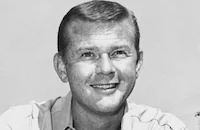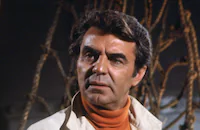Marjorie Morningstar
Brief Synopsis
Cast & Crew
Irving Rapper
Gene Kelly
Natalie Wood
Claire Trevor
Everett Sloane
Marty Milner
Film Details
Technical Specs

Synopsis
Sweet old Samson Morgenstern visits his nephew Arnold Morgenstern, a businessman whose success has allowed him to move his family out of the Bronx into a lovely new West Side apartment. The Morgensterns are celebrating the bar mitzvah of young Seth, who happily accepts when Samson gives him a tallis, the prayer shawl that is worn by adult Jewish men. Seth's beautiful older sister Marjorie is uncertain of her love for wealthy Sandy Lamm, even though her mother Rose is thrilled to learn that he has proposed to her daughter. Marjorie, a drama student at Hunter College, finally persuades her mother to let her think things over while working at a girls' summer camp with her college friend, Marsha Zelenko. Across the lake from the camp is South Wind, a brilliantly lit resort. One night, Marsha and an unwilling Marjorie sneak into the resort, and while her more worldly friend pursues a musician, Marjorie meets and quietly falls for social director Noel Airman, a performer whose talent and looks deeply impress the young women. Noel's assistant, a writer named Wally Wronken, is smitten with Marjorie, but she is too entranced with Noel's singing to notice him. She is about to be thrown out by the resort's owner when Noel, whose real name is Noel Ehrman, saves her from humiliation by offering her a job. Noel calls her "Marjorie Morningstar" as he says good night, and she is so taken with the name that she adopts it. Soon Uncle Samson, who has been sent by the Morgensterns to keep an eye on Marjorie, takes a job in the resort's kitchen, and his arrival comes none too soon, as Noel has invited Marjorie to his cabin for an intimate supper. Samson's concern for Marjorie's welfare touches Noel, and he tries to drive her away, but fails. He is so deeply in love that even the disapproval of her visiting parents hardly phases him. Samson then suffers a fatal heart attack while clowning for the guests during a skit. Afterward, Marjorie returns to college and begins to date Dr. David Harris. Months after Marjorie's graduation, Noel reveals that he now has a respectable job in an advertising firm. The two begin to discuss marriage, and one night, after the Morgenstern family Seder, Noel remarks that he now values family, faith and tradition, all the things he once ridiculed. When Wally becomes an admired Broadway playwright, however, Noel becomes jealous of his former protégé's success and disappears from sight. Marjorie soon finds that he has left his job, begun to drink, and become intimate with a blonde named Imogene Norman. Shocked, she leaves Noel again, but some time later, when a teary Marsha, who is about to marry a wealthy, cigar-chomping older man, calls her a fool for abandoning such an intense love, Marjorie becomes confused. At the wedding, Noel appears and announces to Marjorie that the musical he has worked on for years is nearly complete, and begs her to return to him. This time, Marjorie gives herself to Noel completely. At Marjorie's urging, Marsha's husband finances a Broadway production of Noel's play, Princess Jones , even after Noel insults him. The play is a disaster, and once again, Noel disappears. Ignoring his written request to be left alone, Marjorie searches for her lover all over Europe. Wally eventually informs her that Noel has returned to South Wind, where he finally has found happiness. Despite Wally's warning, Marjorie immediately returns to the resort. Through the window, she sees Noel contentedly performing his song, "A Very Precious Love," for a group of ardent young admirers. Realizing at last that their love is not good for either of them, Marjorie quietly boards a departing bus and is surprised to see that Wally, whom her mother has long admired, is waiting for her.

Director

Irving Rapper
Cast

Gene Kelly

Natalie Wood

Claire Trevor

Everett Sloane

Marty Milner

Carolyn Jones

George Tobias

Martin Balsam

Jesse White

Edward Byrnes

Paul Picerni

Alan Reed
Ruta Lee
Ed Wynn
Howard Bert
Patricia Denise
Lester Dorr
Carl Sklover
Jean Vachon
Elizabeth Harrower
Guy Raymond
Edward Foster
Leslie Bradley
Maida Severn
Fay Nuell
Fred Rapport
Harry Seymour

Shelley Fabares
Walter Clinton

Pierre Watkin
Reginald Sheffield
Sandy Livingston

Peter Brown
Gail Ganley
Russell Ash
Rad Fulton
Efraim Wolff

Lana Wood
Crew
Jack Baker
Gordon Bau
Malcolm Bert
Folmar Blangsted
Murray Cutter
Sammy Fain
Everett Freeman
Rudy Friml Jr.
Ray Heindorf
Max Helfman
Ralph Hurst
Stanley Jones
Bob Koblan
Gus Levene
Lyn Murray
Don Page
Ben Sad
Howard Shoup
Milton Sperling
Burt Steiner
Max Steiner
Harry Stradling
Rabbi Max Vorspan
Paul Francis Webster

Film Details
Technical Specs

Award Nominations
Best Song
Quotes
Trivia
Notes
According to onscreen credits, some exterior scenes were photographed at Scaroon Manor and Camp Cayuga Boys and Girls Camp, at Schroon Lake in the Adirondack Mountains, New York. Other scenes were shot at Bellevue Hospital, Central Park West, Greenwich Village and Radio City Music Hall in New York City, according to a June 30, 1957 New York Times article. A September 1957 Hollywood Reporter news item reported that the film marked the first time Warner Bros. shot musical numbers on location. On October 24, 1955, a Los Angeles Times news item reported that Jack Warner, the head of Warner Bros. Studios, paid Herman Wouk one million dollars, "probably the highest price ever paid for any story," for the screen rights to the author's best-selling novel. Other sources, however, claim that Wouk received no cash up front, but negotiated for 50 percent of the film's profits.
Contemporary sources note that Wouk served in a supervisory capacity during the two-year pre-production period, overseeing the screenplay and casting, and also supervised filming at Scaroon Manor. A May 1957 Hollywood Reporter news item reported that Paul Sylbert was to be the set designer for the film. However, only Ralph Hurst is listed in the onscreen credits and Sylbert's contribution to the final film has not been determined. Information included in the PCA files reveals that the PCA wanted the producers to make sure that the illicit affair between Noel and Marjorie was compensated for by the characters' acknowledgment of their wrongdoing.
A January 1957 Hollywood Reporter news item reported that four actresses vying for the role of "Marjorie" appeared on the Ed Sullivan television show. According to the June 30, 1957 article in New York Times, Edward G. Robinson and Bette Davis were considered to play "Marjorie's" parents, and Conrad Janis and Norma Crane were tested for other roles. Although their appearance in the film has not been confirmed, August and September 1957 Hollywood Reporter news items added the following actors to the cast: Enrique Valdez, Alfredo Seville, Norman Stevens, Barnett Woolf, Florence Vinsen, Greta Ullman, Ellen Kilston, Howard Bert, dance team Rosita and Mario, and children Allen Digioia, William Wolff and Janis Kahn. Although an Hollywood Reporter news item adds Richard Deacon to the cast, he is not identifiable in the viewed print.
The Variety reviewer complained that in the film version the "Jewish flavor" of the novel was "watered down." The Los Angeles Examiner reviewer also noted the picture's "lack of stress on the Jewish faith...so important in the book." The Hollywood Reporter reviewer, however, called the film "beautifully produced and magnificently acted" and "an act of brotherhood." According to modern sources, Jack Warner wanted Danny Kaye to play "Noel," but Kaye refused. Sammy Fain and Paul Francis Webster's song "A Very Precious Love" was nominated for an Academy Award.

Miscellaneous Notes
Released in United States Spring March 1958
Released in United States on Video November 15, 1987
Released in United States Spring March 1958
Released in United States on Video November 15, 1987











